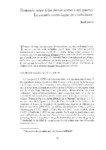Pretendo amar a los demás como a mí mismo: la escuela como lugar de ciudadanía

View/
Use this link to cite
http://hdl.handle.net/2183/2697Collections
Metadata
Show full item recordTitle
Pretendo amar a los demás como a mí mismo: la escuela como lugar de ciudadaníaAuthor(s)
Date
1997Citation
Sociológica. Revista de pensamiento social, 1997, 2: 121-131. ISSN: 1137-1234
Abstract
[Abstract] Present is always the result of an accumulation of different historical ages. Inside
any social group, persons living together but belongig to different age cohorts have
also different ideas about social reproduction. Regarding ethics, two great para..
dign1s coexist in the present: economy, that's directed to maxiluizing profit, and
generates contradictions between individuals and social groups; religion, that tries
to overcome those contradictions by developin.g ideas of solidarity. The author of
this paper has developed social research about inforlual and formal education. He
argues in favour of a non..authoritarian pedagogy, resulting of interaction between
thougtful persons, on the basis of introspection, the use of comparative luethod,
and the opening of school to social reality. [Resumen] El presente es el resultado de una acumulación de épocas históricas, generándo..
se una "estratigrafía" que se puede reconocer en la diversidad de ideas que animan
a personas pertenecientes a las distintas cohortes de edad que coponen cualquier
grupo familiar o local. En el terreno de la ética, dos grandes paradigmas recorren la
historia del pensamiento occidental y se entrecruzan en el presente: la econolnía,
dirigida a maximizar el lucro, que genera contradicciones entre individuos y grupos
sociales; la religión, que más allá de la metáfora de la divinidad, intenta superar estas
contradicciones sistel11.atizando ideas de solidaridad. El autor reflexiona sobre las
diferencias entre el sistema educativo informal y formal. La reforma educativa debe..
ría basarse en una pedagogía no autoritaria, resultado de la interacción entre seres
hUlnanos reflexivos, basada en el método comparativo y en la apertura de la escue..
la a la realidad social.
ISSN
1137-1234





